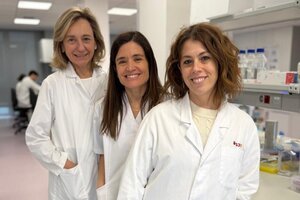A study tests the effectiveness of anticancer drugs in the treatment of PTEN hamartoma tumor syndrome
The research team led by Dr. Mariona Graupera of Institut de Recerca contra la Leucèmia Josep Carreras, together with Dr. Sandra Castillo of Institut de Recerca Sant Joan de Déu, and the multidisciplinary vascular anomalies team coordinated by Dr. Eulàlia Baselga, Head of the Dermatology Department at SJD Barcelona Children's Hospital, has conducted a study to determine the genetic origin of vascular malformations in patients with PTEN hamartoma tumor syndrome (PHTS) and has identified a potential treatment.
What is PTEN hamartoma tumor syndrome (PHTS)?
PTEN hamartoma tumor syndrome (PHTS) is a rare genetic disease caused by mutations in the PTEN gene. This gene plays a key role in regulating cell growth, and its alteration can lead to uncontrolled cell proliferation, resulting in benign tumors (hamartomas) and an increased risk of cancer. This condition affects approximately 1 in every 200,000 people.
PHTS can be diagnosed at different stages of life. In some cases, it is detected in childhood when clinical signs such as macrocephaly or the presence of hamartomas appear, while in other patients it is diagnosed in adulthood following the appearance of neoplasia. Definitive confirmation of the diagnosis is made through genetic testing to detect the mutation in the PTEN gene.
"Early diagnosis, especially when vascular malformations are detected, could facilitate the monitoring and surveillance of tumors and cancer. In this study, three patients were diagnosed with PHTS after identifying a vascular malformation, which allowed us to conduct exhaustive follow-up, during which asymptomatic cysts were detected in two of them," explains Dr. Eulàlia Baselga, head of the Dermatology Department at SJD Barcelona Children's Hospital.
Genetic Discovery
Detailed analysis of biopsies and endothelial cells from patients has revealed that in these individuals, the functional copy of the PTEN gene is replaced by a nonfunctional copy in endothelial cells, through a process known as somatic uniparental disomy.
The study "Somatic uniparental disomy of PTEN in endothelial cells causes vascular malformations in patients with PTEN Hamartoma Tumor Syndrome," recently published in the American Association for Cancer Research journal Cancer Discovery, conducted in preclinical mouse models, has shown that PI3K pathway inhibitors, such as rapamycin and capivasertib, could be effective in reducing the associated blood vessel overgrowth. Furthermore, the inhibitors capivasertib and alpelisib, recently approved for the treatment of certain types of breast cancer, act directly on the molecular processes that trigger the disease.
"Our study has allowed us to identify a key genetic mechanism in vascular malformations associated with PTEN hamartoma tumor syndrome. This discovery not only helps us better understand the disease, but also opens new avenues for diagnosis and the development of more precise and effective therapies for patients," emphasizes Dr. Sandra Castillo, principal investigator of the Pathobiology of Tumors and Vascular Malformations research line at Institut de Recerca Sant Joan de Déu.
Future Perspectives
Despite the promising results, the scientific team cautions that further research is needed to determine the long-term therapeutic effects of these inhibitors. It is not yet clear whether these treatments could modify disease progression beyond reducing vascular malformations. Furthermore, treatment may need to be chronic, as recurrence has been observed in other types of vascular malformations after discontinuing medication.
The next steps in the research will focus on analyzing potential treatment resistance and exploring alternative therapeutic strategies, such as intermittent use of drugs or combining different inhibitors.
This study represents a breakthrough in the understanding and treatment of a rare syndrome with significant clinical implications, paving the way for future research that could improve the quality of life of patients with PHTS.

This discovery could facilitate earlier diagnosis in children and also help slow the effects of the syndrome from its earliest stages, significantly improving patients' quality of life.
